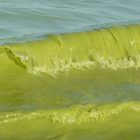
By Emilio Perez Ibarguen
Michigan beer and pop buyers increasingly aren’t bothering to return their bottles and cans to get their deposit back, and in the process left more than $116 million on the table last year. Some beverage industry representatives are pointing to the decrease as a sign that the law has become irrelevant. Meanwhile, retailers and environmentalists alike are looking at what could be done to make returning empties more convenient — although they butt heads on how exactly to do so.

Since the 1990s, algae blooms have become increasingly common each summer in western Lake Erie. The blooms are caused by an overabundance of nutrients, namely phosphorus, that spills into the lake off farms. Credit: National Oceanographic and Atmospheric Administration
By Emilio Perez Ibarguen
Michigan and its neighbors have missed a 2025 deadline to curb the farm pollution that feeds toxic algal blooms in western Lake Erie, despite 10 years of work and millions of dollars spent on the effort.
Now, state officials are revamping their strategy. But they’re not setting a new deadline for now.

By Emilio Perez Ibarguen
Now that Memorial Day is behind us, thoughts naturally turn to summer and the return of watersports on the Great Lakes, but Michiganders tempted to take a dip in those inviting waters now might be in for a chilly surprise. Slowed by a cold May, the Great Lakes are slightly cooler than usual for this time of year.

By Isabella Figueroa
In a new book, archeologists who study past societies of the Great Lakes and Midwest agree “you are what you eat,” but they say there’s a lot more to it than that. It’s also how we eat: the ways we “prepare, cook and consume” those foods are influenced by our history, family and natural environment.The book’s essays use the concept of cuisine to go beyond ingredients when studying thousand-year old foodways in regions that now make up Michigan, Indiana, Illinois, Wisconsin and other states.
More Headlines




